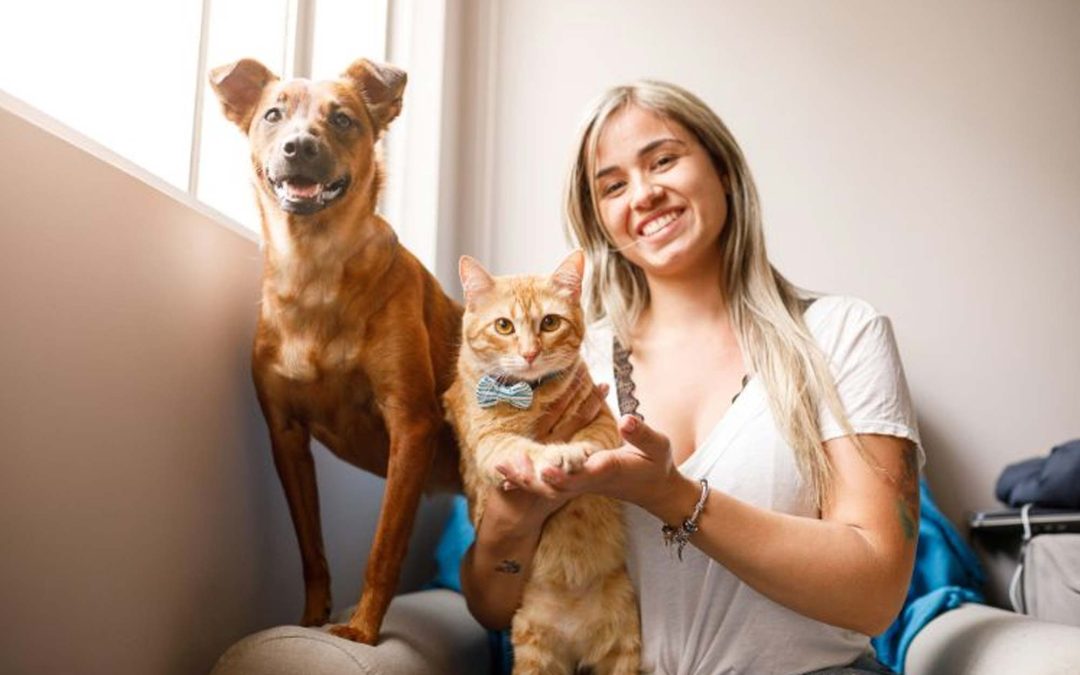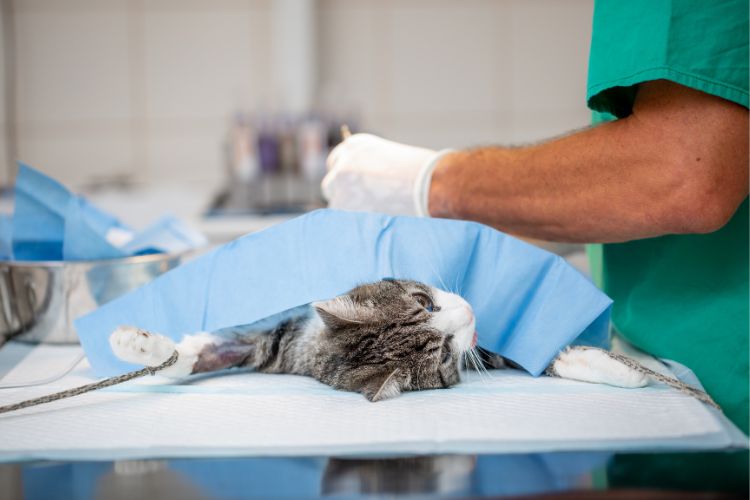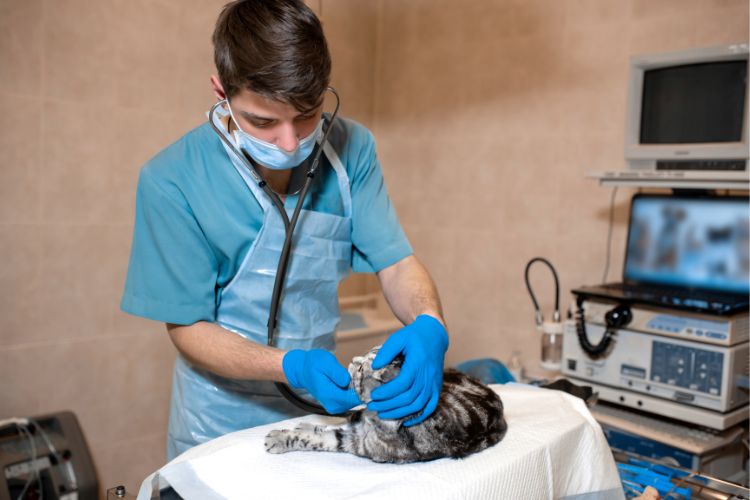One of the first things you’ll hear about when adopting a new pet is that you should desex your puppy or kitten. Naturally, you’re interested in getting more information about the procedure and how it will affect your new best friend. On this page, we will run through some of the most common questions we receive about desexing, as well as the key benefits of this simple procedure.
Q: What does desexing mean?
A: Desexing is sometimes referred to as neutering (for male animals) or spaying (for female animals). However, all are umbrella terms for the surgical sterilisation of your pet. For a female pet, this means removing the ovaries and uterus, whereas for males, it involves removing the testicles. For both sexes, the procedure is quick and simple and has a wide range of health benefits.
Q: Is it safe to desex my pet?
A: A desexing procedure is the most common surgery most vets will perform. Most pets experience very little discomfort and will be back to their usual selves within a day or two. Owners are often surprised by just how well their pets bounce back from the procedure, though some animals will be a little groggy for 24 hours after the surgery. Anaesthetics will be used during the surgery, and pain medication will be given afterwards. Stitches will need to be kept clean and dry until they’re removed 7–10 days after the procedure.
Q: Why should I desex my pet?
A: Desexing is a key part of being a responsible owner. The most obvious benefit is your pet won’t be able to reproduce. There are a wide range of health benefits to desexing your pets, including a decreased chance of certain diseases. Desexed pets, especially male dogs and cats, tend to be happier, show less aggression and are less territorial.
Q: What age should I neuter my pet?
A: This can vary depending on the size, breed and health of your dog or cat. For most dogs, between six and nine months is a good time for them to be desexed. For a cat, you should try to have them desexed before 4 months. If your pet is older than these ages, you should still get them desexed. Talk to your vet about your specific pet, and they will provide their recommendations.
Q: Will you have to shave my pet for the procedure?
A: After the surgery, there will be a few shaved patches on your pet. Just like with humans, the surgery site of an animal needs to be shaved to avoid infection. There will also be a shaved area on one of your pet’s legs where the anaesthetic or sedative has been administered. The great news is your pet won’t care about the shaved areas, and the hair will grow back before you know it.
Q: How long does desexing take?
A: The actual procedure itself is a quick surgery, usually taking between 10 and 30 minutes for male dogs. Female pets take twice as long as males, due to differences in anatomy.
Q: What are some of the other benefits of desexing?
A: Beyond eliminating the chance of unwanted pregnancies, desexing your pet can significantly reduce their risk of developing certain types of cancer and diseases. These include testicular, ovarian and other cancers associated with the reproductive organs.
Q: Will desexing change my pet’s behaviour/personality?
A: Your pet’s personality won’t change from desexing. However, many negative behaviours will be less likely to happen. A lot of the aggression and territorial nature associated with male dogs and cats comes down to hormones and testosterone. This can cause problems with other dogs and members of your family. The lovable quirks and personality traits that define your pet won’t be affected by being desexed.
Q: Will desexing change my pet’s behaviour/personality?
A: Your pet’s personality won’t change from desexing. However, many negative behaviours will be less likely to happen. A lot of the aggression and territorial nature associated with male dogs and cats comes down to hormones and testosterone. This can cause problems with other dogs and members of your family. The lovable quirks and personality traits that define your pet won’t be affected by being desexed.
Q: Will my pet gain weight from being desexed?
A: It is a common myth, especially with female dogs, that pets gain weight due to being desexed. While there will be hormonal changes in your pet due to the procedure, diet and activity levels are the main factors in maintaining a healthy weight in a pet and avoiding obesity. Adapting their diet to suit their metabolism, as you would as a pet ages, is the best bet for helping your furry friend stay in shape.
Q: Will my pet be less aggressive after desexing?
A: While desexed pets certainly can display aggressive behaviour, desexing will usually reduce the aggression and territorial behaviours of most animals. Desexed animals are much less likely to fight with other animals or attack humans.
Q: Why is reducing aggression important?
A: Play fights among your pets or even the occasional scuffle are normal, but when a legitimate fight breaks out, there is a serious risk of injury for both the animals and the people around them. Some common injuries we see from fighting include severe flesh wounds, infections, the spread of viruses including FIV, irreversible eye damage leading to blindness, broken bones and even death.
Q: How should I care for my pet after the procedure?
A: For the next few days, keep your pet as calm as possible while they recover. We understand puppies and kittens aren’t known for restraint and common sense, so your best bet is to lower stimulation and avoid roughhousing or more strenuous play. Your vet or vet nurse will happily give you a run down on caring for your pet and answer any questions.
Q: Should I get my pet desexed if I’m sure I can find homes for the litter?
A: Yes, you should. Even if you’re sure friends and family would happily take a puppy or kitten off your hands, remember this has a knock-on effect. There is a surplus of puppies, kittens, dogs and cats in shelters looking for people to give them a home. If your pet brings a litter into the world, they’ll be taking homes that already existing pets could have taken. A litter is a huge responsibility and shouldn’t be considered flippantly.
Q: Are there any issues I should keep an eye out for after surgery?
A: Your dog or cat is unlikely to be at their energetic best for a few days after surgery, but side effects, for the most part, are very minor. However, if you notice any of the following, contact your vet immediately:
- Redness, discharge, swelling or signs of infection at the surgery site
- Reduced appetite for more than a few days
- Torn stitches or the wound opening
- Urinary incontinence
- Lethargy
- Signs your pet is in pain or discomfort
- Vomiting or diarrhea.
As mentioned, these issues are rare, but if they happen, your vet needs to know so they can help your pet. If you’re unsure, it’s better to be safe than sorry.
Q: Is it a legal requirement for me to have my pet desexed?
A: Different states, territories and even local councils have their own specific laws regarding desexing pets. At the time of writing, it is mandatory to desex your pet in the ACT, WA and SA, while in Tasmania, it is only mandatory for cats. Certain suburbs and local councils will have their own regulations, so it is always worth checking.
Q: Who do I talk to about desexing my pet?
A: Any qualified vet should be able to desex your pet. Any general veterinarian practice or clinic will offer this service.
Q: Why do veterinarians and animal welfare groups advocate desexing animals?
A: Beyond the health benefits, both physical and mental, that desexing will have on your furry friend, desexing pets helps avoid unwanted litters. A single litter can contain between 1 and 12 animals, with 3 to 7 being the average for dogs and 1 to 9 for cats. All these animals being born put a strain on shelters, and, unfortunately, many animals end up homeless or worse. Feral dogs and cats also have a terrible impact on the native environment. Avoiding these litters makes life easier for everyone, including the animals themselves.
Why bring your pet to Rossmore Vet Hospital
Rossmore Vet Hospital has been committed to providing the best care for animals since 1986. Our team has over fifty years of experience, including ten veterinarians and 35 staff. We offer many services, including desexing and service to Rossmore and the surrounding suburbs, including Bringelly, Camden, Green Valley, Hoxton Park, Kemps Creek, Leppington, Narellan, Oran Park and Prestons.
Whether your pet needs emergency care, just a check-up or anything in between, our team is here to help.
The right choice
Desexing is an essential part of being a responsible pet owner, regardless of the breed of cat or dog you have. By performing this simple procedure, you’ll improve the lives of both you and your furry friend and help the community at large.
Rossmore Vet Hospital is passionate about providing the best care for animals, big and small. If you have further questions about desexing your pet or would like to make an appointment, get in touch with our friendly team today!





